
My depression and stress level only worsened so about two years ago I delved into how stress and depression affect your ability to feel any interest in sex or even find it enjoyable. Hormones and chemicals are released that pretty much chase away your sex drive and even diminishes your ability to enjoy sex when you finally get around to it. Depression not only releases chemicals that have a negative effect but also packages it along with negative thoughts. Mentally and physically you can be your own worst enemy when it comes to sex.
There are two factors to look at when assessing depression’s effect on your sex drive. One is how neurotransmitters and hormones released by depression will lower your libido and the other is the mental state of mind in which your brain thinks you out of wanting or enjoying sex. Stress and anxiety can significantly increase at the same time. Research has suggested that all this can trigger the release of hormones that can suppress your sex drive, very similar to how stressful situations release chemicals that produce the same reaction. Basically it’s like the stress of the holidays (feeling overwhelmed, over scheduled and stressed out by family, work or events which can be accompanied by severe depression) all year long.
Researchers have noticed that the release of neurotransmitters serotonin, norepinephrine, and dopamine have something to do with depression but are not sure how or why. Antidepressants work for some because they regulate these neurotransmitters. Reuptake inhibitors (reuptake is when the released substance is reabsorbed) work to keep these chemicals in your body longer. SSRIs regulate serotonin reuptake and are the most common. SNRIs regulate serotonin and norepinephrine reuptake while NDRIs regulate norepinephrine and dopamine reuptake. The last is represented by only one drug, Wellbutrin. There are also SARIs, MAOIs, Tricyclics and Tetracyclics. I simply have no space here to go over them all. Each works in a different way to prevent reuptake.
While this may work with some people it doesn’t with everyone. An even more disappointing fact is while anti-depressants may make some feel better, pretty much all of them suppress your sex drive. So while they may work to make you feel better, arousal and achievement is difficult if not downright impossible while taking the medication. There isn’t even conclusive evidence on how these neurotransmitters really work to contribute to depression. Concrete research results are difficult to come by. Research continues into depression’s connection to neurotransmitters, the limbic system and the role of the hypothalamus.
When you experience stress and anxiety hormones, the hypothalamus, the adrenal cortex and the pituitary gland all have a part in releasing hormones. Hormones like cortisol and adrenaline (or epinephrine) can be helpful to you in small doses as it increases heart rate, blood pressure and metabolic rate. Basically part of your fight or flight response. Cortisol suppresses low priority functions that make you less effective in times of crisis to help you focus and save energy for things needed to survive. Cortisol will actually inhibit sex hormones. So depression is probably triggering reuptake of chemicals you need to feel better and once you add stress to the menu you are releasing chemicals that suppress your libido.
Welcome to my world, the magical world of stress+depression.
On top of all this you have the subjective issues that accompany depression, those things that you can’t really assign to a chemical or hormonal imbalance. Depression comes with a reduced, or completely removed, ability to experience any kind of pleasure. You simply stop enjoying everything, including sex. You also have other issues affecting your desire. People with depression may lose connection with their partners or feel no arousal with new partners due to their feelings of disconnection or desire to withdraw from the world. This can even mean lack of physical touch of any kind resulting in the loss of certain chemical releases that accompany touch, especially prolonged touch such as hugging or kissing. (Hello oxytocin!) Depression can trigger anger or anxiety, both enemies of fun in the hormonal/chemical release and reuptake battlefield. Anxiety, a stressor, can in turn deal out things like lack of sleep, inability to concentrate, irritability, lack of energy and constant worry. These can then turn into highly negative thoughts about yourself or bringing you constantly into the worst-case scenario mindset.
None of this is conducive to feeling sexy or fostering positive feelings about sex. A combination of these things can put a great strain on a relationship. You can find yourself in a nonstop circle of feeling depressed, lack of sex and intimacy creates tension or strife in your relationship, which triggers depression and stress, which keeps you from wanting or enjoying sex, which triggers more anxiety/depression/stress. It can be a frightening non-stop carousel of negative emotions.
Working on your depression and trying to remove stressors can help. Talk to your partner and your doctor about ways to minimize these effects. Taking time for yourself even if it’s just 10 minute a day can really help. Meditation or meditative breathing can help calm you and increase the amount of oxygen you’re receiving. Take a look at your diet; poor choices can actually decrease your sex drive. Watching what you eat and daily exercise (as little as 20-30min a day) has been known to decrease the effects of depression and stress which could then lead to an increase in desire. Find time to connect with your partner that doesn’t have the stress of sexual performance involved. Hugs, simple kisses, even just holding hands can help to release those feel good chemicals. Sometimes attempting the sex you want, even if your brain is telling you it’s not interested, sparks the body over the mind. Talk to your partner and come up with things that will work for you.
If you don’t have a full time partner look for these connections elsewhere with family, friends or a local cuddle party. Non-sexual touch can help you feel more connected with yourself and others while in turn lure that libido back when needed. A hug releases oxytocin after 20 seconds so hold on a little longer if you can. Make time to talk, share stories, have a laugh, make eye contact (another hormone releaser), anything that can connect you with others and your partner will help to undo some of the destructive effects of depression and stress.
Your brain is your largest sex organ but it can also be your biggest enemy. While the cold war may never actually end, depression is a life long issue, you can remove yourself from the battlefield and have a fulfilled and sexy life again.


2 Comments
Great article, Miko. I have felt personally much of what you have described. I appreciate your research and articulate deliver which allowed me the additional insight I gained. I would love to see more essays, like this one, which are well-crafted, well-researched and documented, yet very personal and generously filled with first-hand experiences.
Great article.
Stress, trauma, severe depression & zero libido nearly did in our 16 year marriage. Counseling, therapeutic doses of fish oils, Red Ginseng & St.Johns Wort, along with lots of patience saved it & we are better than ever(with no dangerous/negative side effects ). While this may not be the answer for everyone, it is an option that should be investigated. It is not nearly-instant, as with pharmaceuticals & takes some tweaking but it has literally been a life & marriage saver for us.